September 2019: Olive Tree

Volume II/Issue 41/September 2019


From The Editorial Desk
Suicide-Looking For A Way Out Of Life

Suicide is neither a funny thing nor as the M*a*s*h theme song says, is it painless. People everyday consider “ending it all.” In fact, Suicide is the third leading cause of death among 15-24 year olds. According to the National Institute of Mental Health, at the time of this editorial eighteen teenagers per day kill themselves in the United States. Every 80 minutes another teenagers commits suicide. Over a hundred teens per week, and the total come to a staggering 6,500 lives lost. Not only that, but over 1000 teens per day attempt to commit suicide. That’s almost 1 teen per minute. 73% of kids admit having thought about suicide. How many of you know someone who has talked about or attempted suicide? The statistics show that at least 70% of you know someone who has attempted it. And that is just the Teens. Each year more and more Adults give into suicide as well.
A suicidal person is typically so wracked with mental or emotional pain that they are absolutely desperate to escape it. They are totally miserable and are certain that the only way to find happiness is to end their life. They typically are not considering the negative effects of their choice on the family members. They actually may be deluded by self-pity into thinking that everyone will be glad they are gone. Sadly, their pain is so great that they become focused only on escaping it and do not realize how their choice will hurt the people they love. Their self-focus is extreme self-centeredness.
Suicide is an extreme act of self-love, because it says, "I am so committed to my own happiness that I will take my life to gain it." Suicide is rooted in selfishness, because it is an attempt to satisfy self-serving desires at the expense of the feelings or needs of others.
There are five basic manifestations of self-love which prompt suicide:
One is Vengeance – Those who have vengeance in their hear have a desire to hurt those who hurt them. They says things like "I'll show them ..." "They'll be sorry ..." "They'll see …". But Saint Paul says in Romans 12:17-20: Recompence to no man evil for evil. Providing good things, not only in the sight of God, but also in the sight of all men. If it be possible, as much as is in you, have peace with all men. Revenge not yourselves, my dearly beloved; but give place unto wrath, for it is written: Revenge is mine, I will repay, saith the Lord. But if thy enemy be hungry, give him to eat; if he thirst, give him to drink. For, doing this, thou shalt heap coals of fire upon his head.
A second manifestation of self-love which prompts suicide is Guilt -To relieve our conscience we attempt to atone for our sins.
When Judas agreed to betray Jesus’ whereabouts to the chief priests and elders, he apparently didn’t anticipate that it would result in Jesus’ crucifixion. When he realized that he would be partly responsible for the death of a man he knew was innocent, he was filled with remorse. In a vain attempt to reverse what he’d done, Judas went back to the chief priests and elders with the money he’d received from them. He was planning to return it, perhaps hoping his act would spark some remorse in them so they might release Jesus. But Judas the betrayer soon realized that they had betrayed him. Although they previously treated him as an important partner, he had served their purpose, and they could now care less about him, his money or his guilty conscience. And they certainly didn’t want to hear anything that would tempt them to feel guilty for their part in Jesus’ death. Realizing that he had been their pawn, Judas angrily threw the thirty pieces of silver onto the floor of the Temple. He knew he was guilty of a great sin, and to keep the money, profiting by his betrayal, would make his sin even greater. But getting rid of the money didn’t alleviate his guilt. Jesus was still going to die and Judas couldn’t reverse what he’d done. Utterly in despair Saint Matthew says: “he cast down the pieces of silver in the temple, and departed, and went and hanged himself.” Matthew 27:5.
Why did Judas hang himself? He saw death as a solution to his problem.
Suicide is never a good solution to any problem. His taking his own life didn’t lessen Judas’ guilt. Nor did he atone for his sin by his act. What Judas needed was to put his trust and faith in Jesus as the Son of God. To fully surrender His life to Him. If he had possessed such faith, he would have never betrayed Jesus in the first place. Had he gained such a faith after betraying the Lord, he would have believed that Jesus could forgive him.
A Third manifestation of self-love which prompts suicide is avoiding trials. To escape unhappiness death is sought.
As a Christian we understand that in Jesus we can have peace, Jesus said in John 16:33 that, “In the world ye shall have tribulation: but be of good cheer; I have overcome the world.” In 2 Samuel 17 we read of a man named Ahitophel. The Bible mentions this man in three places only, yet his life is intertwined with King David from the time that he was crowned in Hebron to the time of the death of Absalom.
In 2 Samuel 16:23 we are told that the counsel of Ahitophel “was as if one consulted the word of God; so was all the counsel of Ahithophel esteemed, both by David and by Absalom." He was renowned for his wisdom, and understanding. We find him mentioned as the King's counselor in. 1 Chronicles 27:33. It appears that he was the first and held his position up until the time of Absalom's rebellion. Ahitophel served David, from the begining of his reign in Hebron, and was close to him for years. Suddenly he turns on his King, and joins the conspiracy of Absalom, and then finding his advice not followed he hangs himself. Herein lies an interesting tale.
Interestingly, Jesus quoted this verse in speaking of Judas at the last supper, as the betrayer, who like Ahitophel turned against the one who entrusted him with responsibility.
When Ahitophel saw that his advice to Absalom to attack David immediately and kill him, was rejected, he did not want to have to face the trials that laid ahead. He knew that David would come out the victor and there was no future for him, so he went home, related the events to his family, and according to Josephus, he went into an inner room, hanged himself, and the family buried him.
A fourth manifestation of self-love which prompts suicide is to solicit pity. In other words, we want others to love us or feel sorry for us. They tend to says things like:
"I am such a burden to everyone." "The world will be better off without me." "Maybe they'll miss me if I'm gone."
And last but not least, a fifth manifestation of self-love which prompts suicide it for religious merit . It is done for a noble cause, to gain exaltation in the after-life. Examples would be WW2 Japanese pilots, Buddhist priest protesters, Muslim truck-bombers the list goes on.
Giving up one's life to achieve religious merit is for personal gain and not to be compared with a sacrificial act, such as the death of Christ. True, selfless sacrifice benefits others and gains nothing for the one dying.
Suicide is not an act of genuine self-hatred
Many are tempted to think that suicide is an act of self-hatred, but Scripture teaches that no one actually hates himself, "For no man ever hated his own flesh; but nourisheth and cherisheth it" Ephesians 5:29.
When Jesus taught that we are to love our neighbors as ourselves in Matthew 22:30, his premise was that everyone loved themselves intensely, and needed to love others with the same intensity. In commanding us to love he used the Greek word agape, which means commitment. He did not teach that we are to have fond affection for our neighbors, but that we are to be committed to them in the same we are committed to ourselves. In other words, the same time, energy, and importance we give to ourselves, we are to give to our neighbors. Those who feel like they first need to learn to love themselves before they will be able to obey Christ's command are tragically mistaken -- those full of self-hatred or suffering from "low self esteem" are excessively committed to themselves, and are obligated to be as committed to their neighbors. In fact, they are so devoted to themselves that they cannot stop thinking about themselves -- they are on their own mind all day long. Their problem is not too little self love, but too much!
Regarding suicide, it is true that someone who takes his own life is inadvertently doing harm to himself, and doesn't appear to be "nourishing" and "cherishing" his flesh, but as we have shown, his motives for doing self-harm express self-interest. May all who are tempted with suicide flee from such selfishness! There is healing for our painful wounds in Jesus. Let nothing stop you and pursue Him with all your heart. He has the power to heal all that pains you.
So what can a person do who struggles with wanting to commit suicide?
First of all, acknowledge that you are a sinner. Don't compare yourself with others and find any comfort in imagining that you are better than them. Sin is like a deadly poison. Whether you drink one drop or a hundred drops of poison, you still die. So, if you want to make a good start in your Christian life, acknowledge that you are no better than the worst sinner in the world. Then decide to turn from all known sin in your life. That includes your self will, your self love, and your self desires.
Then believe in Christ. That means to commit yourself to Christ - and not just to believe something about Him in your mind. You can believe in someone without committing yourself to him. A bride is asked at her wedding, "Are you willing to commit yourself to this man?" Supposing she replied saying, "I believe he is a very good man. But I am not sure whether I want to commit my whole life and future to him". Then she cannot be married to him, because she does not have faith in him. When a woman gets married, her whole life's direction changes. She changes her last name to the man's last name. She leaves her parents' home and goes to live with her husband. She may not know where he will live, but she trusts her entire future to him. She has faith in him. That is a picture of what it means to have faith in Christ.
The next step you must take is water-baptism. In baptism, you are testifying that you have finished with your old life and have made Jesus Christ Lord of your life. In baptism we receive the remission of our sins, and the gift of Gods Holy Spirit to help us live the Christian life. In baptism we are saved from hell, our sins are washed away, and we become a new creature, a new person with a new heart that desire what Christ wants for us. A heart that wants His will in our life. And a heart full of love for first God and then others.


Reflections on my Sixtieth Birthday
This month We celebrate Our sixtieth birthday. The celebration of the anniversary of one's birth became more prominent about a century ago with the use of a song sung to celebrate the anniversary of one's birth. But how should we as Christians celebrate the anniversary of our own birth? What does birth mean to us? With the exception of four people, we are all born subject to sin. Is this something to celebrate? In the Church we celebrate three birthdays, Jesus, Mary and John the Baptist. All three were free from original sin at birth. No other birthday is celebrated by the Church. Instead, often we celebrate a person's heavenly birthday, the day they died and went into heaven, especially the birthdays of the martyrs.
In the Gospels we read the wrong way to celebrate a birthday: "But on Herod's birthday, the daughter of Herodias danced before them: and pleased Herod." (Matthew 14:6) As a result of this birthday party, Saint John the Baptist was beheaded. We should not be celebrating our birthday with dancing girls. In Sacred Scripture we do not read of God's people celebrating birthdays. In Maccabees (II Maccabees 6:7) we read of some of the evils happening in God's temple at this time, which is a prefigure of our own: "But they were led by bitter constraint on the king's birthday to the sacrifices: and when the feast of Bacchus was kept, they were compelled to go about crowned with ivy in honour of Bacchus."
A friend of Ours had a custom. On his birthday he would call up his mother and thank her for bringing him into this world. "A woman, when she is in labour, hath sorrow, because her hour is come; but when she hath brought forth the child, she remembereth no more the anguish, for joy that a man is born into the world." (John 16:21) Do we stop and consider the sacrifices our parents made to bring us into this world? Do we think of the sacrifices they made to raise us? Instead of thinking of ourselves, let us think of others on our birthday.
Saint John Eudes has some beautiful prayers for the anniversary of our birth. Saint John reminds us of the honor that is due to God, because of the great blessings He has given us; honor we should have paid on the day of our birth. He also reminds us that on this day we were born subject to original. We should ask God's forgiveness for this. Our birthday is not necessarily a day for rejoicing. We should thank God for the many blessings He has given us since our conception. "Before I formed thee in the bowels of thy mother, I knew thee." (Jeremias 1:5) God has been with us from the beginning and formed us for a special mission, as He informed Jeremias of his. God planned our life before we were ever conceived.
We should direct all of our thoughts to the spiritual. We begin with our birthday, thanking God for having patience with us, because of our original sin. Saint John Eudes also has devotions for the anniversary of our Baptism. Consider this great day, when we were freed from sin! We should also consider our patron saints. The patron saint given in Baptism and also in Confirmation. Religious also remember their patron in their religious name. We should get to know our patron saints and learn from them. If we have fallen away and come back to God, let us celebrate the anniversary of our conversion with prayer and penance as is befitting penitents. A priest observed last century that 85% of the saints were penitents. All a penitent is a baptized person, who fell into mortal sin and returned. Let us join the host of penitents who are now in heaven praising and thanking God for the gift of repentance.
Additionally, we should have our own favorite saints, saints whose lives speak to us in some way. We should come close to them and ask them to help us join us in the heavenly kingdom. Remember that saints have made it home. Once they were in exile as we are. Some for five years, some ten, some twenty, some sixty and even a few for over a century in exile here on earth. Our exile here is sixty years today, and God may yet have something for Us to accomplish.
Saint John Eudes is one of Our favorite saints. His feast is on August 19th, and We remember him on this day. The Breviary tells us: "Courageously withstanding the doctrines of the Jansenists, he preserved unalterable obedience towards the Chair of Peter, and he constantly prayed to God, both for his enemies as well as for his brethren." Today we are also fighting Jansenism in unique forms. When We first became acquainted with this saint, the fight was fresh in Our minds. In order to fight Jansenism, which chills the heart, we read: "His matchless zeal was very conspicuous in promoting the salutary devotion towards the most sacred Hearts of Jesus and Mary, whose liturgical worship he was the first of all to devise, although not without some divine inspiration. He is therefore held to be the father, the teacher, and the apostle of that worship." These two devotions counter the pride and rigidity of the Jansenists, who are still among us today. Notice God aided this saint, as He will help us when we need it. God had a special plan for Saint John Eudes, as he has a special plan for each and every one of us. Our birthday is a good time to come before God and confess our sins and ask Him to keep us on the course He wants us on. Let us pray on our birthdays, remembering we would not have this birthday without God's loving care.
"More than either we desire or deserve..."
I love to go to Mass. And as a priest I certainly love to say Mass. To me the Mass is beautiful. I wouldn't miss it. Sundays are not Sundays if I do not begin the day by going to church; hearing the Word of God; and receiving Our Lord's Precious Body and Blood at Communion time. There is just so much in the Mass to pay attention to because it is just chock-full of meaning. In other words, every action by the priest has a purpose. Every prayer whether uttered aloud or said silently means something. And because there is so much richness of meaning in every single Mass, it is understandable that sometimes we miss out on something very meaningful. For example, I would imagine that very few people pay attention to the "Collect" near the beginning of Mass. What is the Collect? The Collect could be described as the gathering prayer by the priest right before the readings begin. The Collect directs our intentions for that particular Mass and addresses it to God.
Most people probably focus on the readings appointed for Mass that day. And this is understandable. Whether it be one of the Epistles from St. Paul, for example, or the Gospel of the day telling us a story about the life of Our Blessed Lord. But as I say the other prayers in the Missal are not only beautiful they are very rich in meaning if we would only pay attention to what they say. A very good example of a Collect rich with meaning would be as follows:
"ALMIGHTY and everlasting God, who art always more ready to hear than we to pray, and art wont to give more than either we desire or deserve; Pour down upon us the abundance of thy mercy; forgiving us those things whereof our conscience is afraid, and giving us those good things which we are not worthy to ask, but through the merits and mediation of Jesus Christ, thy Son, our Lord. Amen." (Collect for the Twelfth Sunday after Trinity)
This Collect really knocked me for a loop, so to speak, when I read it. In particular, the first part really struck home for me. "Almighty and everlasting God, Who art always more ready to hear than we to pray, and art wont to give more than either we desire or deserve . . . . " It would be so easy to gloss over this if you heard it being said at Mass. But, in my opinion, we could spend the rest of our life focusing on the reality and truth of what was just said: God is more ready to listen than we are even to pray in the first place. And that He is ready to give us even better things than we have ever imagined or dreamed of. And the fact that He is ready and willing to give to His children when we do not even deserve to be rewarded to begin with. As I stated, this Collect is so rich with meaning we could spend the rest of our lives pondering these words. These words speak to the wonderfulness of Our Heavenly Father. "The Lord is gracious, and full of compassion . . . " (Psalm 145:8)
Everything that we have, everything that we possess comes from Our Heavenly Father. Whether it be the life we have been given . . . the air we breathe . . . the roof over our head . . . the food we partake . . . the talents and abilities each of us possess . . . everything we have has been given to us by Our Heavenly Father. St. Paul recognized this fact and it was a common theme he presented throughout the Epistles he wrote to the various churches. For example, in the Fifteenth Chapter of his First Epistle to the Corinthians, St. Paul writes: "For I am the least of the apostles, that am not meet to be called an apostle, because I persecuted the church of God. But by the grace of God I am what I am: and his grace which was bestowed upon me was not in vain; but I laboured more abundantly than they all: yet not I, but the grace of God which was with me. Therefore whether it were I or they, so we preach, and so ye believed" (I Corinthians 15:9-11) Yes, it is true that St. Paul, in this passage, states "I am what I am" but it is so important to remember that he preceded this statement with "But by the grace of God . . . ." Thus: "But by the grace of God I am what I am." (I Corinthians 15:10) All of us could make this our motto in life. Who are we if not for God? What would we have if not for the goodness of Our Heavenly Father? Who would I be if not for God? St. Paul is the first to acknowledge all the things he done in life. For example, he goes on to say " . . . . but I laboured more abundantly than they all . . . " This would sound almost like a boast coming from St. Paul, wouldn't it? And yet St. Paul always puts his "boasting" into proper context when he continues: " . . . yet not I, but the grace of God which was with me." (I Cor. 15:10) Again, St. Paul emphasizes that any strength that he possesses or any skill or ability which he can boast of, is due to the grace of God being with him. As I like to say, each one of us has skills and abilities which only we possess. And each one of us should use our specific skills and abilities for the glory of God. But we should imitate St. Paul in acknowledging where these gifts and abilities come from. "But by the grace of God I am what I am." (I Cor. 15:10). We are who we are, yes, but we are who we are by the grace of God. He has created us. He has given us life. He nourishes us and sustains us. And He loves us.
Again, St. Paul continues on this train of thought when he writes his Second Epistle to the Corinthians. We hear in the Third Chapter of this Epistle: ". . . not that we are sufficient of ourselves to think any thing as of ourselves; but our sufficiency is of God . . ." (II Corinthians 3:5) God is the One Who provides. He is the One Who sustains us. But we must do our part as well. We need to be open to God's holy will. We need to also recognize that God is the One to Whom we owe everything.
"Blessed be the God and Father of Our Lord Jesus Christ, which according to His abundant mercy hath begotten us again into a lively hope by the Resurrection of Jesus Christ from the dead. To an inheritance incorruptible, and undefiled, and that fadeth not away, reserved in Heaven for you." (I St. Peter 1:3-4)
God, through His abundant mercy, St Peter tells us, not only has begotten us but has given us hope of everlasting salvation through the efforts of Our Blessed Saviour. It was through the efforts of Our Blessed Lord taking our place on the Cross at Calvary. But He not only carried our sins on His shoulders He also rose again on the third day in order to defeat death and afford us with the opportunity to enjoy eternal life with Him.
Our Lord stated plainly: "I go to prepare a place for you." (St. John 14:2) It is there where we will be in the Presence of Our Heavenly Father. The riches and the glory of this world pale in comparison to the glory of Our Heavenly Father. Our Lord promises us that He goes to prepare a place for us. He is doing this because of the love He has for us. God willing we will all end up there and if we do, please God, it will not because we were deserving to be there. It will be because Our God is a merciful God. He is a forgiving God. He is a loving God. God loves us so much that He gave His Only Begotten Son to die on the Cross. Not for His sake, . . . . He died for our sake. He died for you and for me. God gives us more than we could ever dream of . . . ever imagine.

The Funny Pharmacy
A joyful mind maketh age flourishing: a sorrowful spirit drieth up the bones. - Proverbs 17:22







Did (the "electors" of Roncalli) all lose their offices because they participated in the election?
Yes, by electing an unqualified man, they tendered their resignations by schism in accepting him as Pope. (Canon 188, paragraph 4).

The Pope Speaks: September 2019
A Most Common Sin

Let us consider five verses from Sacred Scripture on the sins of our own times. After this, we will consider one of these sins, although each one could have a whole book devoted to it.
Know also this, that, in the last days, shall come dangerous times. Men shall be lovers of themselves, covetous, haughty, proud, blasphemers, disobedient to parents, ungrateful, wicked, Without affection, without peace, slanderers, incontinent, unmerciful, without kindness, Traitors, stubborn, puffed up, and lovers of pleasures more than of God: Having an appearance indeed of godliness, but denying the power thereof. Now these avoid. 1
As we read these verses, we recognize our own selves in some of these sins, and may be hoping that our pet sin will not be chosen today. Aren't we lovers of our own selves and lovers of pleasures more than of God? And yet, that is not our subject today. In fact, most likely there is one sin we have all decided we haven't committed, and yet we all have. Sacred Scripture is full of stories of these kinds of sinners. One priest ventures that eighty-five percent of the saints committed this sin, and the lives of the saints is full of these kind of sinners. Indeed, we focus on two people, who committed this sin on the first Good Friday. And so, just what is this sin we think we have not and are not committing?
“Judas Iscariot, who was the traitor.” 2 Yes, my friends, we are all traitors. However, let us not lose hope, for there were two traitors on Good Friday.
“And he said: I say to thee, Peter, the cock shall not crow this day, till thou thrice deniest that thou knowest me.” 3 And yet we know that Peter became a Saint, but on this day this prophecy of Jesus was fulfilled.
“And the Lord turning looked on Peter. And Peter remembered the word of the Lord, as he had said: Before the cock crow, thou shalt deny me thrice. And Peter going out, wept bitterly.” 4
Have we gone out and wept bitterly? No, we haven't even admitted that we are traitors, and yet all of us are. What bigger betrayal is there than sin, and we are all sinners. What we try to do is minimize our betrayal of Almighty God. We think to our-self: "We aren't really that bad," and yet this is simply not true. We are far worse than we want to admit. It is said that Peter wept over his betrayal the rest of his life. Do we weep over our own betrayal?
Of our own times we read: "And then shall many be scandalized: and shall betray one another: and shall hate one another. And many false prophets shall rise, and shall seduce many." (Matthew 24:10-11) There are four terms we need to understand in here, which are often misunderstood.
Scandal means an action which is likely to lead another into sin. Many are led into sin today. Often we see an action and say that it scandalizes us, when this is not true. We are not edified by the action, but we are not led into sin either.
Scripture exhorts us to love and not to hate. We are even told to love our enemies. And yet today, what do we read of? Hatred, which often goes into action in other sins. Do we love everyone? We love God with our whole heart, soul, mind, body and strength. Then do we love each other for the love of God. In other words, out of love, we want what is most likely to bring all to salvation, which often means conversion from their current life of sin to a life of virtue. Let us consider someone, who has wronged us and has called us all manner of evil everywhere they can. There are many places to call someone evil today. Let us consider that the stories they are spreading are outright lies, they have made up. What are we praying for? Are we praying for their conversion or for their destruction? We should be praying for their conversion and ready to do anything God may ask us to to help them become fervent Christians.
Seduce means to deceive or to lead astray. Jesus warns us of these times: "For there shall arise false Christs and false prophets, and shall shew great signs and wonders, insomuch as to deceive (if possible) even the elect." (Matthew 24:24)
Let us return to our sin of treachery. We have also been considering the fruits of treachery, which are scandal and seduction. When we are sinners, we lead others to join us in our sins and attempt to seduce others. Sin doesn't seem so bad, when we are in the company of sinners. The book of Psalms begins with the admonition: "Blessed is the man who hath not walked in the counsel of the ungodly, nor stood in the way of sinners, nor sat in the chair of pestilence." We should stay in the company of people who are striving to become saints, who heed the next admonition in the first Psalm: "But his will is in the law of the Lord, and on his law he shall meditate day and night."
A man advised his son to stay around those who knew more than he did, because he just might learn something. We should surround ourselves with those who know more about the Science of the Saints than we do. This is the only class we must pass with flying colors. We can no longer be traitors, betraying Almighty God and those around us.
1 II Timothy 3:1-4
2 Luke 6:16
3 Luke 22:34
4 Luke 22:61-2


Why God Answers Some Prayers and Not Others
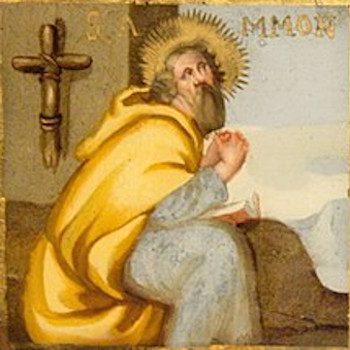
from the works of Saint Ammon the Hermit (Fourth Century)
WORK TO PLEASE GOD, NOT TO PLEASE MEN
You see, then, how God is angry at the works of these men, and gives them none of the requests that they ask of Him, but rather resists them. For they do not their works in faith, but superficially. Therefore, the divine power does not dwell in them, but they are diseased in all their works, in whatever they set their hand to. For this reason they have not known the power of grace, nor its freedom from care, not its joy, but their soul is weighed down with a load in all their works. The greater part of our generation are such: they have not received the divine power that fattens the soul, prepares it to rejoice, and brings it day by day that gladness which makes the heart fervent in God. For the work that they do, they do as if it were for men. This is why this power does not come upon them; for an abomination to the power of God is the man who does his works as though for men's benefit.
FIGHT AGAINST PRIDE ABOVE ALL ELSE
Do you therefore, my beloved, whose fruit is reckoned in God, strive in all your works against the spirit of vainglory, that you may conquer it in all things, and that your whole body may be acceptable, and abide living with its Creator, and that you may receive the divine power, which is better than all these things. For I am persuaded, my beloved, that as long as you do all that is in your power in making war on the spirit of vainglory, and strive against it continually, your body will be alive. For this evil spirit attacks man in every work of righteousness to which he sets his hand, wanting to render his fruit useless and destroy it, thus preventing, as far as possible, men from performing works of righteousness; it wrestles with those who want to become faithful, and when any of them are praised by men for being faithful or humble or enduring shame, the evil spirit immediately engages in battle with them, and overcomes some of them, scattering and quenching their body. In so doing it prompts them to leave their virtuous way of life, and involve themselves in pleasing men, thus destroying their "body," though men reckon that they have gained something. This is why He does not give them the power, but leaves them empty, because He has not found their body good; and He deprives them of that great sweetness of grace.
But do you, my beloved, strive against the spirit of vainglory at all times, so that you may conquer it in everything, in order that the divine power may accompany you at all times. And I will pray God for you, that this joy may be given you always, for nothing is more free from care. And if after receiving this joy you see that your fervor withdraws and leaves you, seek it again and it will return. For this fervor is like fire which changes the cold into its own power. And if you see your heart weighed down temporarily, bring your soul before you and question it until it becomes fervent again and is set on fire in God. For the prophet David, too, on seeing his heart weighed down, said, "I have poured out my heart by myself (Psalms 42:4), I have remembered the days of old, and meditated on all your works, I lifted up my hands unto you; my soul thirsts after you as does a thirsty land." (Psalms 143:5-6) This is what David did when he saw his soul grow cold, until he had made it fervent again; and he received the divine sweetness both by day and by night. Do this, then, my beloved, and you will grow, and God will reveal to you great mysteries.
May God keep you in health of spirit and soul and body, till He brings you into the kingdom with your fathers who completed a good life, unto ages of ages, amen.

Saints from East and West
Saints whose feasts are celebrated this month
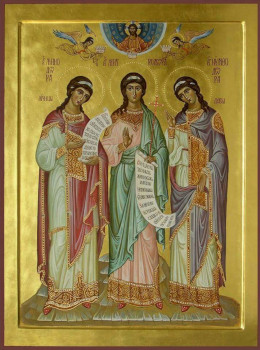
September 10 (Byzantine) - The Holy Martyrs Menodora, Metrodora, And Nymphodora
The Holy Virgins Menodora, Metrodora, and Nymphodora (305-311), were sisters by birth, and they were from Bithynia (Asia Minor).
Distinguished for their especial piety, the Christian sisters wanted to preserve their virginity and avoid worldly association. They chose for themselves a solitary place in the wilderness and spent their lives in deeds of fasting and prayer.
Reports about the holy life of the virgins soon spread about, since through their prayers healings of the sick began to occur. The Bithynia region was governed at that time by a governor named Frontonus, who gave orders to arrest the sisters and bring them before him. At first he tried to persuade them to renounce Christ, promising great honours and rewards. But the holy sisters steadfastly confessed their faith before him, rejecting all the suggestions of the governor, and declaring to him, that they did not value temporal earthly blessings, and that they were prepared to die for their Heavenly Bridegroom. Going into a rage, the governor took out his wrath on the eldest of them, Saint Menodora. The saint bravely endured the torments and finally, she cried out: "Lord Jesus Christ, joy of my heart, my hope, in peace receive Thou my soul!" And with these words she gave up her spirit to God.
Four days later they brought to the court the younger sisters Metrodora and Nymphodora. They put before them the battered body of their elder sister to frighten them. The virgins wept over her, but they likewise remained steadfast. Then they subjected Saint Metrodora to torture. She died, crying out with her last breath to her beloved Lord Jesus Christ. Then they turned to the third sister Nymphodora. Before her lay the bruised bodies of her elder sisters. Frontonus hoped that this spectacle would intimidate the young virgin. Under pretense that he was charmed by her youth and beauty, he began amiably to urge her to worship the pagan gods, promising great rewards and honours. Saint Nymphodora rebuffed his words, and shared the fate of her older sisters. She was tortured to death with blows from iron rods.
The bodies of the holy martyrs were to be burnt on a bonfire, but a strong rain extinguished the blazing fire, and lightning felled Frontonus and his servant. Christians took up the bodies of the holy sisters and reverently buried them at the so-called Warm Springs at Pythias (Bithynia).

September 18 - Saint Joseph of Cupertino
Joseph Desa was born June 17, 1603, at Cupertino, a small village between Brindisi and Otranto. His parents were poor and unfortunate. Joseph himself was born in a shed at the back of the house, because his father, a carpenter, was unable to pay his debts and the home was being sold up. His childhood was unhappy. His widowed mother looked on him as a nuisance and a burden, and treated him with great severity, and he developed an extreme absentmindedness and inertia. He would forget his meals, and when reminded of them say simply, "I forgot," and wander open-mouthed in an aimless way about the village so that he earned the nick-name of "Boccaperta," the gaper. He had a hot temper, which made him more unpopular, but was exemplary and even precocious in his religious duties. When the time came for him to try and earn his own living, Joseph was bound apprentice to a shoemaker, which trade he applied himself to for some time, but without any success.
When he was seventeen he presented himself to be received amongst the Conventual Franciscans, but they refused to have him. Then he went to the Capuchins, and they took him as a lay-brother; but after eight months he was dismissed as unequal to the duties of the order: his clumsiness and preoccupation made him an apparently impossible subject, for he dropped piles of plates and dishes on the refectory floor, forgot to do things he was told, and could not be trusted even to make up the kitchen fire. Joseph then turned for help to a wealthy uncle, who curtly refused to aid an obvious good-for-nothing, and the young man returned home in despair and misery. His mother was not at all pleased to see him on her hands again and used her influence with her brother, a Conventual Franciscan, to have him accepted by the friars of his order at Grottella as a servant. He was given a tertiary habit and put to work in the stables. Now a change seems to have come over Joseph; at any rate he was more successful in his duties, and his humility, his sweetness, his love of mortification and penance gained him so much regard that in 1625 it was resolved he should be admitted amongst the religious of the choir, that he might qualify himself for holy orders.
Joseph therefore began his novitiate, and his virtues rendered him an object of admiration; but his lack of progress in studies was also remarked. Try as he would, the extent of his human accomplishments was to read badly and to write worse. He had no gift of eloquence or for exposition, the one text on which he had something to say being, "Blessed is the womb that bore thee." When he came up for examination for the diaconate the bishop opened the gospels at random and his eye fell on that text: he asked Brother Joseph to expound it, which he did well. When it was a question of the priesthood, the first candidates were so satisfactory that the remainder, Joseph among them, were passed without examination.
From the time of his ordination St Joseph's life was one long succession of ecstasies, miracles of healing and supernatural happenings on a scale not paralleled in the reasonably authenticated life of any other saint. Anything that in any way could be particularly referred to God or the mysteries of religion was liable to ravish him from his senses and make him oblivious to what was going on around him; the absent-mindedness and abstraction of his childhood now had an end and a purpose clearly seen. Especially during Mass or the Divine Office he would be lifted off his feet in rapture. During the seventeen years he remained at Grottella over seventy occasions are recorded of his levitation, the most marvellous being when the friars were building a calvary. The middle cross of the group was thirty-six feet high and correspondingly heavy, defying the efforts of ten men to lift it. St Joseph is said to have "flown" seventy yards from the door of the house to the cross, picked it up in his arms as if it were a straw, and deposited it in its place. This staggering feat is not attested by an eye-witness, and, in common with most of his earlier marvels, was recorded only after his death, when plenty of time had elapsed in which events could be exaggerated and legends arise. But, whatever their exact nature and extent, the daily life of Saint Joseph was surrounded by such disturbing phenomena that for thirty-five years he was not allowed to celebrate Mass in public, to keep choir, to take his meals with his brethren, or to attend processions and other public functions.
In 1653, for reasons which are not known, the Inquisition of Perugia was instructed to remove Saint Joseph from the care of his own order and put him in charge of Capuchins at a lonely friary among the hills of Pietrarossa, where he was to live in the strictest seclusion. "Have I got to go to prison then?" he asked, and departed at once - leaving his hat, his cloak, his breviary and his spectacles hehind him. To prison, in effect, he had gone. He was not allowed to leave the convent enclosure, to speak to anyone but the friars, to write or to receive letters; he was completely cut off from the world. Apart from wondering why he should be sundered from his fellow Conventuals and treated like a criminal, this life must have been particularly satisfactory to Saint Joseph. But soon his whereabouts was discovered and pilgrims flocked to the place; whereupon he was spirited away to lead the same sort of life with the Capuchins of Fossombrone. The rest of his life was spent like this. When in 1655 the chapter general of the Conventual Franciscans asked for the return of their saint to Assisi, Pope Alexander VI I replied that one Saint Francis at Assisi was enough, but in 1657 he was allowed to go to the Conventual house at Osimo. Here the seclusion was, however, even more strict, and only selected religious were allowed to visit him in his cell. But all this time, and till the end, supernatural manifestations were his daily portion: he was in effect deserted by man but God was ever more clearly with him. He fell sick on August 10, 1663, and knew that his end was at hand; five weeks later he died, at the age of sixty. He was canonized in 1767.


Books to feed your faith!
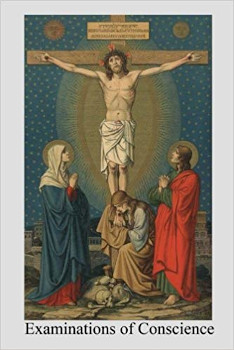
$14.95
This work contains several examinations of conscience from Catholic classic books. It also contains Saint Alphonsus' instruction on Confession from his Catechism. Further notes are contained on modern sins and on conversion. One examination of conscience distinguishes between mortal and venial sins. In preparing for the Sacrament of Confession it is easy to get into a rut, using the same examination of conscience for every Confession. These examinations are from various sources and are provided to help us shake up our spiritual life. By varying our routine, we can more easily identify our sins and bring them to the tribunal of Penance where we can present them before the Divine Physician and His human representative, the duly authorized priest. In this way our confessor can prescribe the remedies for our sins, so that we can heed the advice of Jesus: “Go now and sin no more, lest some worse thing happen to you.” (John 5:14) Since these come from timeless older works, they have been updated by this author to include the sins that are so easily committed with modern technology, such as radio, television, moves, the computer and the internet. We hope all will benefit from the sage advice contained in this book.

Spiritual Despondency and Temptations
$15.95
In this book you will therefore find wholesome instruction, great knowledge of the interior life, and of the human heart, - the result of years of experience in the direction of souls. The subject is at once both highly important and very difficult. The Author has not confined himself to general principles and vague maxims, but he has entered into the very sanctuary of the soul, into its secret folds and most intricate windings. The thread of Reason, the light of Faith, and the torch of Experience have led him safely through that labyrinth where so many lose themselves, rashly attempting to explore it without the proper guides. A few principles, presented under different aspects, solve all difficulties, throw light upon doubts that are ever recurring, expose all the subterfuges of self-love, sloth, and cowardice, refute their objections, and silence their excuses. The Author has followed the most useful plan for works of this kind. He adopts the method of reasoning - and his reasoning is as clear as it is solid. The greater number of persons who profess piety prefer appeals to their imagination and to their heart, rather than to their reason. They like to be excited by lively descriptions, and by tender and touching language; but in so doing, they are seeking a passing gratification rather than a real and permanent benefit. Such descriptions and sentiments soon fade away, but the fruits of conviction are more lasting. Pure reason and true faith never vary; imagination and feeling are incessantly changing according to the different objects which act upon them. It is from indolence that feeling is preferred to reasoning. The greater part of mankind are indolent, and hence there are so few who care to reflect and reason. But one who has an earnest love for virtue and duty, who is anxious about his salvation, should not shrink from the mental effort which the exercise of reason and of faith requires. We should remember that no sincere and permanent resolution can be taken without a conviction of its necessity. This is according to the natural order of reason, and to the economy of grace. The understanding must be enlightened before the will can be moved. This work appears to be specially intended for the instruction of persons living in religious communities, and for seculars aiming at perfection; but in this age of indifference and discouragement all who profess the true faith may here find no little help to undeceive them in their errors, and to strengthen them against the wiles of self-love. We venture to hope that even Directors of consciences may discover therein that which will increase their light, and supply for any want of experience in their difficult and dangerous ministry.
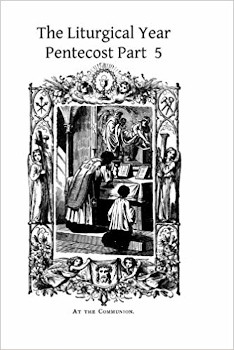
The Liturgical Year: Pentecost Part 5 (Volume 14)
$19.95
This is a fifteen volume set, which is being brought back into print for the edification of the Faithful. Anyone who wishes to appreciate the timeless Tridentine Mass and liturgy will find this set a valuable aid in that endeavor. Dom Gueranger has produced a most excellent work, which began the liturgical movement. We pray that this set of books will bring many more to a true appreciation of the Latin Mass and the Divine Office of the Catholic Church. At one time, under the impulse of that Spirit, which animated the admirable Psalmist and the Prophets, she takes the subject of her canticles from the Books of the Old Testament; at another, showing herself to be the daughter and sister of the holy Apostles, she intones the canticles written in the Books of the New Covenant; and finally, remembering that she, too, has had given to her the trumpet and harp, she at times gives way to the Spirit which animates her, and sings her own new canticle. From these three sources comes the divine element which we call the Liturgy. The Prayer of the Church is, therefore, the most pleasing to the ear and heart of God, and therefore the most efficacious of all prayers. Happy, then, is he who prays with the Church, and unites his own petitions with those of this Spouse, who is so dear to her Lord, that he gives her all she asks. It was for this reason that our Blessed Saviour taught us to say our Father, and not my Father; give us, forgive us, deliver us, and not give me, forgive me, deliver me. Hence, we find that, for upwards of a thousand years, the Church, who prays in her temples seven times in the day, and once again during the night, did not pray alone. The people kept her company, and fed themselves with delight on the manna which is hidden under the words and mysteries of the divine Liturgy. Thus initiated into the sacred Cycle of the mysteries of the Christian year, the faithful, attentive to the teachings of the Spirit, came to know the secrets of eternal life ; and, without any further preparation, a Christian was not unfrequently chosen by the Bishops to be a Priest, or even a Bishop, that he might go and pour out on the people the treasures of wisdom and love, which he had drunk in at the very fountain-head. For whilst Prayer said in union with the Church is the light of the understanding, it is the fire of divine love for the heart. The Christian soul neither needs nor wishes to avoid the company of the Church, when she would converse with God, and praise his greatness and his mercy. She knows that the company of the Spouse of Christ could not be a distraction to her. Is not the soul herself a part of this Church, which is the Spouse? Has not Jesus Christ said: Father, may they be one, as we also are one? and, when many are gathered in his name, does not this same Saviour assure us that he is in the midst of them? The soul, therefore, may converse freely with her God, who tells her that he is so near her; she may sing praise, as David did, in the sight of the Angels, whose eternal prayer blends with the prayer which the Church utters in time.
For More Good Traditional Catholic Books:


Bertha's Easy Chicken Pot Pie

Ingredients:
1 recipe pastry for a 9 inch double crust pie
1 carrot, chopped
1 head fresh broccoli, chopped
2 boneless chicken breast halves, cooked and chopped
1 (10.75 ounce) can condensed cream of chicken soup
⅔ cup milk
1 cup shredded Cheddar cheese
½ teaspoon salt
Directions:
Preheat oven to 425 degrees F (220 degrees C).
Steam carrots and broccoli in a covered pot for 3 minutes, until slightly tender but still firm.
In a large bowl, mix together carrots, broccoli, chicken, soup, milk, cheese, and salt. Spoon mixture into pastry-lined 9 inch pie pan and cover with top crust. Seal edges and cut steam vents in top.
Bake in preheated oven for 30 minutes, until golden brown.
Mother's Own Apple Fritters

Ingredients:1 quart vegetable oil for deep-frying
1 1/2 cups all-purpose flour
1 tablespoon white sugar
2 teaspoons baking powder
1/2 teaspoon salt
2/3 cup milk
2 eggs, beaten
1 tablespoon vegetable oil
3 cups apples - peeled, cored and chopped
1 cup cinnamon sugar
Directions:
Heat the oil in a deep-fryer or electric skillet to 375 degrees F (190 degrees C).
In a large bowl, stir together the flour, sugar, baking powder and salt. Pour in the milk, eggs and oil and stir until well blended. Mix in apples until they are evenly distributed.
Drop spoonfuls of the batter into the hot oil and fry until golden on both sides, about 5 minutes depending on the size. Fry in smaller batches so they are not crowded. Remove from the hot oil using a slotted spoon and drain briefly on paper towels. Toss with cinnamon sugar while still warm.

Video sermons and instructions: Timeless timely truths for living the Faith
15th Sunday after Pentecost - 2011
Birthday of the Blessed Virgin Mary
Getting the Gospel Right
Ep 6 The Cost of Being A Disciple Of Christ

NEW! "OUR DAILY PASSION" PODCAST

“I am nailed to the cross with Christ. nevertheless I live; yet not I; but Christ liveth in me.” (Galatians 2:20)
It is only when the 'I' is crucified that Christ can manifest Himself within us. The Holy Spirit transforms us into the image of Christ day by day, and year by year, But the pathway of transformation into the image of Christ is via the PASSION of the cross. “If any man will come after me, let him deny himself, and take up his cross daily, and follow me.” (Luke 9:23) If we through the Spirit, allow the passion of the cross to put to death our self-life, we shall know the abundance of Christ's life, not otherwise.
We at OUR DAILY PASSION Podcast desire to help others die to self and live for God daily through our Sermons, Devotionals, Scripture Studies, and Catechism Lessons that come from a Catholic perspective!
To listen and/or subscribe, click here to go to the podcast site: https://pod.co/our-daily-passion


VIE CATHOLIC RADIO EVENTS FOR SEPTEMBER
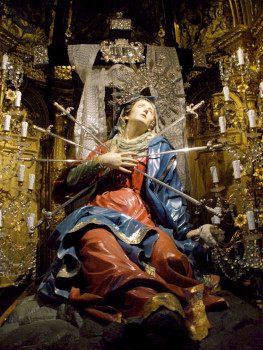
And Simeon blessed them and said to Mary his mother, “Behold, this child is appointed for the fall and rising of many in Israel, and for a sign that is opposed (and a sword will pierce through your own soul also), so that thoughts from many hearts may be revealed.” Luke 2:34-35
Each month of the liturgical year is devoted to a particular Catholic tradition, usually centered on a Feast during that month. As August is the Month of the Immaculate Heart of Mary, September follows as the Month of Our Lady of Sorrows.
We see this theme of joy followed by affliction mirrored in the liturgical calendar in two September Feasts – the Exaltation of the Holy Cross, and the Feast of Our Lady of Sorrows.
The name of Our Lady of Sorrows centers on the extraordinary and bittersweet suffering the Blessed Mother experienced during Christ's Passion. Her agony and sorrow was composed of The Circumcision and Prophecy of Simeon; the Flight into Egypt; Loss of Child Jesus for Three Days, Jesus on his Way to Calvary; the Crucifixion, Body of Christ and Lamentations; the Burial of Christ.
During this month of September, we are drawn into the spiritual martyrdom that the Blessed Mother experienced during the physical martyrdom of Jesus. The evils of sin are manifest but conquered through intense suffering. The Blessed Mother's tears of anguish reflect God's washing away of sin. If you haven't ever prayed the Seven Sorrows chaplet, you might want to consider exploring this devotion. This month we will be praying the chaplet Sunday through Monday during our Gregorian Chant programming at 1:30am/7:30am/1:30pm/7:30pm CST.
Other Programs You Do Not Want To Miss:
Sunday Sermon:
You can listen to six Sunday Sermons, including sermons by Saint Alphonsus, and Saint John Vianney each day that could cause permanent life changes by stepping on your toes!
Life Is Worth Living:
Fulton Sheen's renowned and inspiring television series was watched by millions of viewers from all walks of life and every religious belief. His timeless insights give wise, personal and inspiring guidance on the problems affecting our lives in today’s world. His talks cover an amazing variety of subjects, from the character of the Irish to the handling of teenagers. He discusses education, Christianity, relativity, and world affairs. He speaks about love, conscience, fear, motherhood, work. He tells amusing anecdotes, recites poetry, and ponders the fate of the free world as well as America’s destiny.
Fulton Sheen's Catechism:
...is a 50 part series on the fundamental teachings of the Catholic Church recorded in 1965 in the privacy of his own study. This Catechism program is truly priceless! Fulton Sheen's captivating voice and message comes through loud and clear, even for today.
Family Theater:
Family Theater is a dramatic radio show which was produced by Family Theater Productions, a film and radio studio extension of the Family Rosary Crusade founded by the Holy Cross Priest, Father Patrick Peyton, CSC, as a way to promote family prayer. The motto of Holy Cross Family Ministries is "The family that prays together stays together."
The Bible Comes Alive:
Your Story Hour produces family-friendly radio dramas based on the Bible, historical heroes, and true-to-life adventures. Our stories--brought to life by talented voice actors, descriptive sound effects and compelling music--teach Christian values, positive character traits and principles for good decision-making.
Ranger Bill:
Ranger Bill is a Christian radio program from the 1950s. Ranger Bill stars Miron Canaday as the title character and Stumpy Jenkins. And Ed Ronne Sr. as Grey Wolf. The main character, Ranger Bill, is a forest ranger located in the town of Knotty Pine along the Rocky Mountains. The show describes the various tales of the adventures of Ranger Bill and his friends
New! Our Daily Passion:
“I am nailed to the cross with Christ. nevertheless I live; yet not I; but Christ liveth in me.” (Galatians 2:20)
It is only when the 'I' is crucified that Christ can manifest Himself within us. The Holy Spirit transforms us into the image of Christ day by day, and year by year, But the pathway of transformation into the image of Christ is via the PASSION of the cross. “If any man will come after me, let him deny himself, and take up his cross daily, and follow me.” (Luke 9:23) If we through the Spirit, allow the passion of the cross to put to death our self-life, we shall know the abundance of Christ's life, not otherwise.
We, at OUR DAILY PASSION desire to help others die to self and live for God daily through our Sermons, Devotionals, Scripture Studies, and Catechism Lessons that come from a Catholic perspective! And now you can hear it each day on the VIE Catholic Radio Network.
Taking time To Pray:
Through out the week you can pray along with us. “I desire therefore, first of all, that supplications, prayers, intercessions, and thanksgivings be made for all men: For kings, and for all that are in high station: that we may lead a quiet and a peaceable life in all piety and chastity. For this is good and acceptable in the sight of God our Saviour” (1 Timothy 2:1-2) With that in mind join us in prayer!
-
The Angelus
-
The Rosary
-
The Divine Mercy
-
The Stations of the Cross
-
New! The Seven Sorrow Chaplet
-
Plus More Sprinkled Through out The Day
Sacred Moments:
“Hello Friends, Welcome to this weeks Sacred Moments.
It has been said that “The higher goal of spiritual living is not to amass a wealth of information, but to face sacred moments.” and that is what our desire is for you today. To experience a sacred moment. One that you can savour through out the day. One that reminds you that God is alive and active in your live.” Tune in for Music and Meditation on Gods Word each week.
Lamp and Light Bible Study:
Lamp and Light Bible Study is not a ‘theological’ study but a ‘life application’ study.
Our in house Priest will show that every single book of the Bible is interesting and has a message for us today. It deals with key aspects of the Christian life and speaks more to the heart than to the head.
Catechism Corner:
Catechizing with a fresh perspective. Using the Holy Scriptures and the Catechism of the Council of Trent as foundational bases.
The Catholic Bookshelf:
The Catholic Bookshelf is a program where you will hear fiction and non-fiction Classic Catholic books narrated and read by various men and women who are natural communicators and who brings each book alive with realism and emotion. You won’t want to miss a single chapter!
Check the Program Guide each week for all scheduled programming.
Support from listeners like you make content like this possible. Why not Celebrate along with us and take a moment to support us by sending a donation to help us keep sharing with you good tradition Catholic programming to help you grow in your faith.

“Bless the Lord, O my soul: O Lord my God, thou art exceedingly great. Thou hast put on praise and beauty: and art clothed with light as with a garment. Who stretchest out the heaven like a pavilion” Psalms 104:1-2
Most people have heard of red shift without necessarily knowing what it means, apart from knowing that it has something to do with stars and galaxies.
Wave forms can appear to be altered if the source of the waves is moving away or towards us. We notice this effect with sound waves – for example, if we are watching a train approaching and passing by. If an object is moving towards us, then its waves will appear to arrive at us slightly shorter than they should be. Shorter waves result in higher pitch. When the train recedes, the waves reach us stretched out a bit, which makes a lower-pitch sound. Therefore, the train approaches with a high pitch sound, but then the sound changes to a lower pitch sound as it passes us.
Something similar happens to light from distant galaxies. In visible light, the longest wavelength is red, while blue light has a shorter wavelength. So red shift does not necessarily imply that an object is red. It tells us that bands in the galaxy’s spectrum are of longer wavelength than expected, so it is called a red shift. In a random universe, one might expect an equal number of red and blue shifts. In practice, blue shifts are rare.
The red shift is probably caused by space itself expanding. And this is consistent with what the Bible says in Psalm 104: “Who stretchest out the heaven like a pavilion”
When we consider the way that God made the heavens, and how it continues to develop as He determines, we cannot help but worship Him and praise His Name.

Catechism Catch-Up
From Thence He Shall Come To Judge The Living And The Dead
John 14:1-3; II Peter 3:3-10
Some may be wondering if it’s too late for anything but the coming judgment when Jesus returns. And that brings us directly to this phrase from the Apostles’ Creed: “I believe … he will come again to judge the living and the dead.” These simple words consist of two complementary truths:
1) Jesus is coming again.
2) Jesus is coming again to judge the living and the dead.
It has been said that the New Testament refers to the second coming of Christ in over 300 verses. That means one of every 13 verses deals with some aspect of our Lord’s return to the earth. It is so central to the New Testament that Christians everywhere have always believed that Jesus will return someday. Though we differ (and argue!) over the details, Those who identify with Christianity unite in believing that Christ himself will return to the earth. Jesus said in John 14:3, “I will come again.” Here are five words that help us understand what that means. His second coming will be …
Personal (It will be Jesus and not some substitute)
Literal (Not a vision or a dream)
Visible (“Every eye will see him”)
Sudden (Not a gradual return)
Unexpected (Like a thief in the night).
Acts 1:11 makes it clear that Jesus himself will one day return to the earth. It will be “this same Jesus” who is coming again. Twice in one verse Luke uses the word “same” to tell us something crucial about the Second Coming. The same Jesus who left will one day return. And he will return the same way that he left. If plain English can have any meaning at all, those words teach us that Jesus is coming back personally, literally, visibly and bodily. We might also add that his coming will be sudden and unexpected. Luke 24:50-52 informs us that as Jesus reached out his hands to bless his disciples, he began to rise from the face of the earth—evidently without any warning whatsoever. We can assume that his return to the earth will be no less astonishing and no less surprising.
This Same Jesus
This is truly an astounding thought. The same Jesus who was born in Bethlehem is coming again. The same Jesus who grew up in Nazareth is coming again. The same Jesus who turned water into wine is coming again. The same Jesus who walked on water is coming again. The same Jesus who healed the nobleman’s son is coming again. The same Jesus who raised Lazarus is coming again. The same Jesus who entered Jerusalem on Palm Sunday is coming again. The same Jesus who was betrayed by Judas is coming again. The same Jesus who was whipped, beaten, scourged, mocked, and condemned to death is coming again. The same Jesus who died on Skull Hill is coming again. The same Jesus who rose from the dead on Easter Sunday morning is coming again. The same Jesus who ascended into heaven is coming again.
That’s what we mean when we say that Jesus is coming again. The actual, historical figure that lived 2,000 years ago on the other side of the world is returning to the earth one more time. There awaits in the future an event more marvelous, more startling, more amazing, and more blessed than anything that has happened in the last 2,000 years. I speak of the literal, visible, bodily return of Christ to the earth. No event may seem less likely to modern men and women; no event is more certain in the light of inspired Scripture.
A Word from Saint Peter
But before we sell our houses and move to the mountains to await the Lord’s return, as some misguided souls have done in the past, let us heed the words of II Peter 3:3-10. In this passage Peter addresses a puzzling question—one that bothered believers in the first century and troubles thoughtful people today. Why hasn’t the Lord returned already? What is he waiting for? Does the 2,000-year delay mean that he isn’t coming at all? Should we give up our Christian hope? Listen to Peter’s answer:
“First of all, you must understand that in the last days scoffers will come, scoffing and following their own evil desires. They will say, “Where is this ‘coming’ he promised? Ever since our fathers died, everything goes on as it has since the beginning of creation.” But they deliberately forget that long ago by God’s word the heavens existed and the earth was formed out of water and by water. By these waters also the world of that time was deluged and destroyed. By the same word the present heavens and earth are reserved for fire, being kept for the day of judgment and destruction of ungodly men. But do not forget this one thing, dear friends: With the Lord a day is like a thousand years, and a thousand years are like a day. The Lord is not slow in keeping his promise, as some understand slowness. He is patient with you, not wanting anyone to perish, but everyone to come to repentance. But the day of the Lord will come like a thief. The heavens will disappear with a roar; the elements will be destroyed by fire, and the earth and everything in it will be laid bare” (II Peter 3:3-10).
This passage is full of important truth that deserves close consideration. Here are three points to ponder:
1) Despite what the scoffers think, the Second Coming is certain because God promised it.
The scoffers will always be with us. They will say, “Twenty centuries have come and gone and still Jesus has not come. Give it up. He’s not coming back.” To which Peter replies, “Think about Noah’s flood.” Before the flood, men lived in reckless disregard for God. They lived as if tomorrow would never come. They sinned in every way possible. But one day the skies poured forth water and the fountains of the great were opened, and water covered the entire earth. If God could do that once, he could do it again—only this time the coming of Christ will bring a judgment of fire to the earth.
2) The Second Coming will usher in a day of judgment for the ungodly.
Notice the sequence of words: water, destruction, judgment, fire. Just as God destroyed the world once with water, the next time he destroys it with fire. For the ungodly, the Second Coming of Christ will be bad news indeed.
3) The Second Coming is delayed to give people a chance to come to Christ.
Here is the good news. The “delay” the scoffers talk about is actually God’s gift to them. He purposely delays the Lord’s return in order to give men and women more time to repent. Verse 9 reveals God’s tender heart toward the lost. He takes no pleasure in the death of the wicked. He does not enjoy sending people to hell. Contrary to popular opinion, he is not some crazed old man in a white beard, laughing while he hurls lightning bolts to the earth. For 2000 years he has held back the final judgment in order to give rebellious men and women a chance to surrender their arms and yield allegiance to Jesus Christ.
As the Creed says, Christ will eventually judge the living and the dead. All must stand before him and give an account. No one can escape that day.
The Bible teaches a resurrection of the righteous and the wicked. The righteous and the unrighteous are raised at the end of the millennium and you will find that that this resurrection is clearly taught in God’s word. In fact, Jesus refers to this resurrection in John 5:28-29: “For the hour cometh, wherein all that are in the graves shall hear the voice of the Son of God. And they that have done good things, shall come forth unto the resurrection of life; but they that have done evil, unto the resurrection of judgment.”
The resurrection of the just we can understand. They are raised to be given eternal rewards.
But why are the dead raised “to be judged” after they have already suffered in hell? The story in Luke 16 may suggest an answer in that the rich man was somehow able to converse freely across the great divide that separated hell from “Abraham’s bosom.” He evidently hoped to convince Abraham to send someone to ease his torments. He also wanted someone to go back and warn his five brothers. These facts suggest that while hell is a place of torment, those who are there know it is not their final destination. They are conscious not only of their sufferings, but of other places, other people and other possibilities. Is it possible that some in hell resent their sentence and argue that they have been treated unfairly? If so, then it makes sense that they will be raised bodily to face the Lord at the final judgment. At that time, all secrets will be revealed, the books will be opened, and ultimate judgment determined. This is not to suggest that after spending “thousand of years” in hell that the Lord will discover they should have gone to heaven. Nor does it suggest that hell itself is a kind of short-term purgatory preparing people for heaven. Perhaps the case is similar to a man who is arrested, denied bail and kept in jail until his trial, at which time the final sentence is pronounced.
But what is that “final sentence?”
Here we come face to face with the most awful reality in all the Bible. After the unsaved dead are raised, after they face the Lord in the final judgment, they are condemned forever to suffer everlasting conscious punishment away from the presence of the Lord. Note the words of II Thessalonians 1:8-9, “...giving vengeance to them who know not God, and who obey not the gospel of our Lord Jesus Christ. Who shall suffer eternal punishment in destruction, from the face of the Lord, and from the glory of his power:” The phrase “eternal punishment in destruction” seems like an oxymoron–destruction that never ends, a process that goes on and on and on. It is an apt description of the final fate of those who do not know Jesus Christ. They suffer forever, they are destroyed forever, they are punished forever.
Revelation 20:11-15 describes exactly what happens when the unsaved dead are finally raised to stand before the Lord.
"And I saw a great white throne, and one sitting upon it, from whose face the earth and heaven fled away, and there was no place found for them. And I saw the dead, great and small, standing in the presence of the throne, and the books were opened; and another book was opened, which is the book of life; and the dead were judged by those things which were written in the books, according to their works. And the sea gave up the dead that were in it, and death and hell gave up their dead that were in them; and they were judged every one according to their works. And hell and death were cast into the pool of fire. This is the second death. And whosoever was not found written in the book of life, was cast into the pool of fire."
Think of it. An entire pool (better translated lake) filled with waves of burning fire. A lake as vast as an ocean, a lake with no shoreline, only wave after wave of burning sulphur and brimstone. In this lake, unbelievers are cast one by one, screaming, pleading, cursing, their voices drowned by the crackling of the flames as they enter the burning fire. Acrid burning smoke fills the lungs, fire hotter than any earthly fire engulfs the human body, pain unlike any human pain courses through the burning veins. Voices cry out, but no one hears, people sink but do not find the bottom. Fire is everywhere, and smoke, and poisonous fumes. Here and there ghastly hunks of humanity desperately swim through the flames. Although they swim forever, they never reach the shore. No ships ply the lake of fire, no fishermen ever visit, no vacationers ever come this way.
As you stand in the distance, two striking facts come before you. First, there is no sun, only an eerie orange-yellow glow that seems to come from within the lake itself, a hideous, hellish emanation that seems to have come out of the bowels of evil. There is no light, no sun, only darkness and shadows. But then you notice something else. Although the fire is burning across the lake, and although the lake is filled with people, no one is consumed. What kind of fire is it that burns but does not destroy?
This is the lake of fire, the final destiny of the unsaved. If my description be rejected as a lurid literalism, let me ask the reader to consider this: If the lake of fire is not literal, if we are to understand it as a kind of symbol, must it not be true that the reality behind the symbol is even worse than the symbol? I have no objection to those who say the fire in hell is not “literal,” if by that they mean that the fire is not the same as human fire since it burns but does not consume.
If this picture of a lake of fire is not “literal,” that must mean that the reality is so terrible that no human words can describe it. Please do not make the mistake of trying to “humanize” hell by playing down the images. The Bible uses “fire” and “darkness” and “torment” too many times for us to glibly say, “That’s not literal.” It means something and the something it means is so eternally terrible that only these awful words and pictures can remotely begin to convey the ultimate meaning.
Let me clarify that point. I am sure my description of the lake of fire is no closer to reality than was Dante’s Inferno. But of this much I am sure. The reality is much worse than anything I or Dante or anyone else could ever imagine.
This is what we mean by “everlasting conscious punishment.” It is the final destiny of those who do not know Jesus Christ. To make it more personal, it is the final destiny of your friends and neighbors, your loved ones, your parents, your brothers, your sisters, your children, if they die without Jesus Christ.
And, yes, it is your destiny if you die without Jesus Christ. Let that thought linger in your mind. The reality of hell is more than just a theoretical doctrine. There is a place reserved for you in the lake of fire unless you by a conscious choice “Do penance, and are baptized in the name of Jesus Christ, for the remission of your sins:” Acts 2:38.
READ MORE FROM THE TRADITIONAL CATECHISM AT THE WEBSITE: https://www.traditionalcatechism.com

Living Catholic:

How Can I Motivate A Teen To Get Up Early In The Morning?
Motivating a Teen to Rise Early: learning to make the most of each day
Rising early in the morning is one of the most productive disciplines a young person can establish. Help a teen realize what he will gain by getting up early and what he will lose if he habitually sleeps in too late. This discipline begins with getting to bed early, so be sure to help him understand the foundation he needs to be successful.
Set A Good Example
Motivating others to do what is right begins with the example of your own behavior. Jesus Christ taught by example. He said, “For I have given you an example, that as I have done to you, so you do also.” (John 13:15). Similarly, Paul told those he discipled to follow him as he followed Christ. "Be ye followers of me, as I also am of Christ." (I Corinthians 11:1.) When you consistently rise early, you can share from firsthand experience how the discipline has benefited your life. Your actions will convince the teen that it can be done.
Pray For Wisdom
Ask God to protect the teen from every wrong influence so that he will be open and responsive to the truth. Ask God to give him wisdom and grace to rise early.
Learn About Great People Who Got Up Early
The value of reading biographies is explained in this proverb: “He that walketh with the wise, shall be wise . . .” (Proverbs 13:20). Encourage the teen to begin by reading Biblical biographies of early risers. I recommend using a Strong’s Exhaustive Concordance. Look up the word early and identify passages of Scripture that tell about Godly individuals who got up early in the morning. Read their stories and learn from their examples.
Share Insights About overcoming Slothfulness.
If a teen is in good health but does not want to get out of bed in the morning, it is likely that he tends toward slothfulness. God gives some vivid descriptions of slothfulness in Proverbs: “As the door turneth upon its hinges, so doth the slothful upon his bed.” (Proverbs 26:14). Help the teen understand the dangers of slothful behavior and the rewards of diligence.
Prepare For Success
Success in getting up in the morning is largely determined by what preparations are made the night before. These preparations should include a well-thought-out schedule for the next day, an agreed-upon time to get up, and a selection of the clothes you’ll wear. Avoid leaving energy-taking decisions for the morning so that when you wake up you are free to focus on the Lord and spend time in Scripture and in you prayers.
Honor the Lord’s Day
We were designed to rest one day in seven. Taking time to rest and honor the Lord’s Day will help you maintain an early-morning schedule through the week. God promises to honor and reward those who keep His day of rest. (see Isaiah 58.)
Consider Why The Teen Is Not Getting Out Of Bed
Just as it is important for a teenager to trust his authorities, it is important for his authorities to understand him. If the teen continues to resist getting up on time, find out what is motivating him to stay in bed. Is he not getting out of bed because he did not get enough sleep, because he doesn’t want to face the day, because he doesn’t have motivation to get up, because he is sick, because he is demonstrating rebellion, or for some other reason? Ask why and then listen. Address the hindrances he faces to getting up on time.
To Learn More Principles For Life Go To: Resources: Principles of Life

Pray for the Holy Father! Pray with the Holy Father!
-
Your prayers are asked this month and every month for the intentions of the Holy Father, Pope Michael.
-
Keep us in your prayers as we begin our new Daily Passion podcast, a new way to reach out in the missionary work of the Church! We ask for prayers for our other activities world wide. We have made good contacts in the Philippines and Japan and ask prayers that these contacts will bear much fruit for the salvation of souls.
-
Be sure to keep St. Helen Catholic Mission in your prayers. Why not go on over to the site now and see what they have to offer and how you might be able to help!
-
Also we ask you to keep in prayer for our Mission: St. Ignatius of Antioch in Arkansas City, Kansas.
-
Your prayers are asked for Father Francis Dominic as he embarks upon the important work entrusted to him within the Church.
-
Pray for those outside the Church and those who do not know God, that they may see the light of grace and be led safely home to the refuge of the Holy Catholic Church.
-
As always, we also ask that you pray for yourself! Never forget your own state of soul. God is calling you to His service in His love. We know that our Lord can count on you to answer.
-
We are all praying especially for you, too. May you correspond with every grace of God!
-
In what other needs or intentions may we pray for you? Let us know!
-
Let us remember that the Church runs on prayer. Without your prayers, God will not work in hearts and souls to bring them to a knowledge of the truth. (I Timothy 2:4)



To Donate by Mail:
Our address is
Vatican in Exile
829 NE Chester
Topeka, Kansas 66616
Make Checks payable to:
Vatican in Exile






 Follow
Follow


